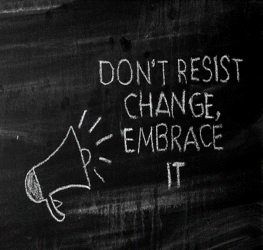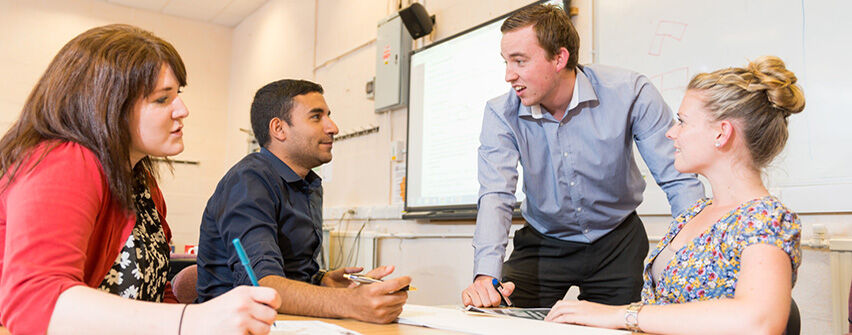This blog post is an opportunity for us both to reflect on the work of bell hooks (1994), particularly her ideas around the power of dialogue and embracing change. We discuss and reflect on our own transitions into full-time academic life and embracing the change it brings.
and Shaun Allen-Dooley, Doctoral Researcher
When first asked to help organise the summer CSPACE Conference, we initially found ourselves facing nerves, doubts and uncertainty. Though both full-time researchers in our first year of a PhD course in Education, thoughts of organising a university conference took us back to the early days of our own teaching careers. Instead of dealing with nerves and doubts about how we might go about organising a lesson, what a good lesson actually looks like, or how might we make learning fun, exciting, and engaging for our learners, there were new questions to get our heads around: How do we go about organising a conference? What does a conference even look like? How can we make this conference fun, exciting, and engaging for everyone attending
These questions share similarities, whether from trainee teachers worried about their early lessons or first-year PhD students apprehensive about helping to organise a conference. But in both situations, it was dialogue, reflection, and research that helped us to realise our own capabilities. Through discussing our own research, we were able to see where our interests met and to learn a little more from each other about education and about ourselves. Within our dialogue, there were opportunities to contemplate our nerves and doubts and to think about our own transitions from full-time teachers to full-time researchers.
‘Transition’ is not an easy word to define, but through regular dialogue, we found that we articulated our individual research around concepts of transition. For Emma, the term ‘transition’ not only signifies the idea of changing from class teacher to academic researcher, but also frames her research study. Before starting the PhD journey, Emma was a primary school teacher and special educational needs coordinator (SENCo). Her love of supporting children with special educational needs and disabilities (SEND) developed, leading to further study in this area and now a PhD. This transition from an in-school practitioner to engaging fully within academic culture is something Watts (2009) describes as a ‘status transition’. This process can be exciting, challenging, and potentially stressful, all of which many can resonate with, for instance when ‘imposter syndrome’ (all too common in academia) creeps in.
At the same time, Emma is currently experiencing the transition to parenthood (Cowan and Cowan, 2000). But as her daughter grows into a fiercely independent toddler, her ‘baby’ has now become her PhD study. These professional and personal transitions can help us to better understand our developing selves, as well as the participants of our research. For Emma, ‘transition’ in her PhD study is a crucial concept that allows for a deeper understanding of how children with SEND experienced starting formal primary education during a period of school closures due to the Covid-19 pandemic. Even in pre-pandemic times, transition into reception class is recognised as a significant change in a child's early life and there is consensus around the importance of transition for children into early primary school, especially for those with SEND (Fontil et al., 2020; Martin et al., 2019). Even though starting school can be an exciting time, it can also be challenging and stressful for children, their families, and their teachers, mirroring the description of a status transition (Watts, 2009).
For Shaun too, ‘transition’ is an important concept to understand as he interrogates what is meant by ‘quality mentoring’ in initial teacher education (ITE) today. Mentoring can mean different things to different people but is often perceived as a simplistic master-and-apprentice dynamic between two people, in which the trainee learns through observation. But Wenger (2008) suggests that trainees may learn from a great number of teachers within a community – not just the established mentor or master, as apprentices may bypass their mentor to seek advice informally from members of a community. The traditional, hierarchical view of mentoring and training may also lead to perceptions of trainees as ‘blank slates’, even though they often come to teaching with a range of skills in the first place.
To illustrate this point, Shaun recalls how mentors and university tutors needed to oversee certain aspects of his development during his own teacher training. On one occasion, trainees were shown how to use an interactive whiteboard – a fairly new initiative at the time. Looking back now, this would have been a great opportunity for both trainees and trainers to learn from each other regarding the use of modern technology in the classroom. As it was, it became more a performative exercise to tick the right boxes and ‘evidence’ learning that was probably already there in the first place. There are opportunities in ITE to view trainees as “contributing colleagues rather than students in need of evaluation” (Bieler, 2010: 421) though our current pedagogical structures of mentoring do not always lend themselves to these ways of thinking.
A ‘status transition’ can describe the same processes as a child starting primary school, a trainee student becoming a qualified teacher, or a teacher becoming a researcher. At every stage, reflecting and engaging with learning and with learners is crucial, and so is embracing the change that comes with it. In each example, the way in which we approach our new roles matters and it is important for transition processes to be mindful of the knowledge and skills that all learners bring, regardless of our own positions of authority.
Critical pedagogy can encourage us to contemplate our place within hierarchical education systems and it is through dialogue that we can begin to learn from one another and engage in critical thinking. Freire teaches us that critical thinking is “thinking which perceives reality as a process, as transformation, rather than as a static entity” (Freire, 2017: 65) and hooks teaches us to embrace an engaged voice that is not “fixed and absolute but always changing, always evolving in dialogue with a world beyond itself.” (hooks, 1994: 11). Both suggest that dialogue is a powerful driving force for embracing change, both in and out of the classroom.
And it is our academic roles that we, as ‘new’ PhD students, must regard as a transforming and transformative process. To do otherwise is to forget where we have come from – whether as a student, as a teacher, or as a mother. Instead, we must go beyond fixed roles and engage with a world that too is in a constant state of change and engage in dialogue within the spaces we work, reiterating hooks’ idea that “to hear each other… to listen to one another, is an exercise in recognition” (hooks, 1994: 41).

This blog has given an opportunity to pause for thought and reflection on our experiences of embracing change and using dialogue when transitioning from practitioners to PhD students. But more than that, this blog has given us the opportunity to show the importance of reflection and dialogue when faced with the unknown (in our case, organising a conference).
We hope the CSPACE Summer Conference will leave you feeling empowered, inspired, and proud to be part of a vocation that hooks calls sacred – our work here today, and for the future of research and teaching is not merely to share information, but to share in the intellectual and spiritual growth of everyone attending this conference and the communities we engage within.
References
Bieler, D. (2010) Dialogic Praxis in Teacher Preparation: A discourse analysis of mentoring talk. English Education, 42(4), pp. 391-426. Available at: https://www.jstor.org/stable/23018019 [Accessed 16 Jun 2022].
Cowan, C. P. and Cowan, P.A. (2000) When Partners Become Parents: The big life change for couples. Mahwah, NJ: Erlbaum
Fontil, L., Gittens, J., Beaudoin, E., and Sladeczek, I. E. (2020) Barriers to and facilitators of successful early school transitions for children with autism spectrum disorders and other developmental disabilities: A systematic review. Journal of Autism and Developmental Disorders, 50(6), pp. 1866–1881.
Freire, P. (2017) Pedagogy of the Oppressed. Great Britain: Penguin Classics.
hooks, b. (1994) Teaching to Transgress: Education as the Practice of Freedom. New York: Routledge.
Martin, T., Dixon, R., Verenikina, I., and Costley, D. (2019) Transitioning primary school students with autism spectrum disorder from a special education setting to a mainstream classroom: successes and difficulties. International Journal of Inclusive Education, 25, pp. 1-16.
Watts, J. H. (2009) From professional to PhD student: challenges of status transition, Teaching in Higher Education, 14(6), pp. 687-691.
Wenger, E. (2008) Communities of Practice: Learning, meaning, and identity. 2nd ed. New York: Cambridge University Press.

